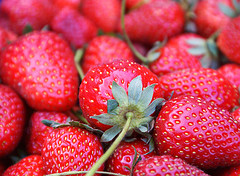Difference between revisions of "Strawberries and Raspberries"
m (→Cooling and storage) |
|||
| (One intermediate revision by one other user not shown) | |||
| Line 17: | Line 17: | ||
==Harvesting and handling== | ==Harvesting and handling== | ||
Strawberries and raspberries have a very brief storage life, perhaps only one or two days under warm conditions. Respiration rate is very high, especially in ripe fruits. Optimal maturity for harvest depends on requirements; colour development and ripening continue during storage. | Strawberries and raspberries have a very brief storage life, perhaps only one or two days under warm conditions. Respiration rate is very high, especially in ripe fruits. Optimal maturity for harvest depends on requirements; colour development and ripening continue during storage. | ||
| − | + | <br><br> | |
Unless processing is intended, postharvest fungicides are little used because of the problems of residues and because of the preference for keeping the fruits dry. | Unless processing is intended, postharvest fungicides are little used because of the problems of residues and because of the preference for keeping the fruits dry. | ||
==Cooling and storage== | ==Cooling and storage== | ||
| − | Rapid reduction of temperature to 1°C (within a few hours of harvest) is best achieved by the method of forced air or pressure cooling. Low temperature serves to minimise metabolic activity and inhibit fungal decay, which is the primary cause of loss in soft fruits. | + | Rapid reduction of temperature to 1°C (within a few hours of harvest) is best achieved by the method of forced air or pressure cooling. Low temperature serves to minimise metabolic activity and inhibit fungal decay, which is the primary cause of loss in soft fruits. Strawberry and raspberry fruit are not sensitive to chilling temperatures and should be stored as cold as possible without freezing. |
| − | + | <br><br> | |
| − | Strawberry and raspberry | + | Storage life can be extended by means of modified atmospheres, and these fruits are able to withstand concentrations of carbon dioxide as high as 10% to 20%, although off-flavours sometimes develop. The main use of modified atmospheres (whole pallet covers) is during transportation when optimal temperature cannot be guaranteed. |
| − | |||
| − | Storage life can be extended by means of modified atmospheres, and these fruits are able to withstand concentrations of carbon dioxide as high as 10% to 20%, although off-flavours sometimes develop. The main use of modified atmospheres (whole pallet covers) is during transportation when optimal temperature cannot be guaranteed. | ||
==Mixed loads== | ==Mixed loads== | ||
Latest revision as of 12:41, 18 January 2021
| Infobox on Strawberries and Raspberries | |
|---|---|
| Example of Strawberries and Raspberries |  |
| Freshness facts | |
| Optimum carrying temperature | 0°C |
| Highest freezing point | - |
| Acceptable product temp. at loading into containers | Max. 2°C above carrying temperature |
| Optimum humidity | 90 to 95% |
| Ventilation setting for containers | 10 m³/hr |
| Storage life | 1 to 7 days |
| Climacteric / non-climacteric | Non-climacteric |
| Ethylene production | Low |
| Ethylene sensitivity | Low |
| Modified / controlled atmosphere | 15%-20% CO2; 5%-10% O2 |
| Potential benefits | Reduced O2 - moderate; increased CO2 very good |
| Availability | |
| Australia / New Zealand South Africa South America |
October - March October - February October - May |
Strawberries and Raspberries
Contents
Harvesting and handling
Strawberries and raspberries have a very brief storage life, perhaps only one or two days under warm conditions. Respiration rate is very high, especially in ripe fruits. Optimal maturity for harvest depends on requirements; colour development and ripening continue during storage.
Unless processing is intended, postharvest fungicides are little used because of the problems of residues and because of the preference for keeping the fruits dry.
Cooling and storage
Rapid reduction of temperature to 1°C (within a few hours of harvest) is best achieved by the method of forced air or pressure cooling. Low temperature serves to minimise metabolic activity and inhibit fungal decay, which is the primary cause of loss in soft fruits. Strawberry and raspberry fruit are not sensitive to chilling temperatures and should be stored as cold as possible without freezing.
Storage life can be extended by means of modified atmospheres, and these fruits are able to withstand concentrations of carbon dioxide as high as 10% to 20%, although off-flavours sometimes develop. The main use of modified atmospheres (whole pallet covers) is during transportation when optimal temperature cannot be guaranteed.
Mixed loads
Raspberries and strawberries can be shipped in mixed loads
Cautions
O2 below 2% can cause off-flavours. CO2 greater than 20% may cause flesh browning and off-flavours.
Storage disorders
Alternaria rot, Anthracnose, Black spot, Blue mould, Cladosporium rot, Cottony rot, Grey mould rot, Leak, Leathery rot, Phomopsis rot, Powdery mildew, Rhizoctonia rot, Rust, Stem end rot, Yeasty rot.











